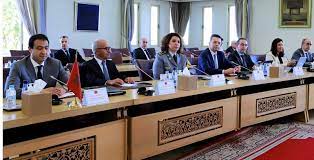 Morocco’s crucial role in managing migratory flows to Spain and Europe was highlighted at the meeting of the Permanent Joint Moroccan-Spanish Migration Group, convened Friday in Rabat and in comments by officials and experts following this meeting.
Morocco’s crucial role in managing migratory flows to Spain and Europe was highlighted at the meeting of the Permanent Joint Moroccan-Spanish Migration Group, convened Friday in Rabat and in comments by officials and experts following this meeting.
The commentators also underlined that Morocco, which bears the brunt of illegal migration, takes a comprehensive and effective approach to fight the phenomenon.
In this connection, Spanish Secretary of State for Security, Rafael Pérez Ruiz, said Spain’s and Morocco’s commitment to continue strengthening bilateral cooperation on migration is an “example to follow.”
“We are neighboring countries and strategic partners, and our daily work together has been an example, especially in the area of migration flows control and fighting human trafficking networks,” Rafael Pérez was quoted as saying in a statement issued by the Spanish Ministry of Interior following the Rabat meeting.
“We firmly believe that the best option to address this challenge is bilateral cooperation with the countries of origin and with those who share the same challenge,” he added.
Pérez Ruiz highlighted the collaboration mechanisms that have proved their “operational effectiveness” in recent years, namely the joint sea, land and air patrols by the Guardia Civil and the Gendarmerie Royale, the exchange of information and police collaboration to dismantle human trafficking networks, and the establishment of police cooperation centers in Tangier and Algeciras.
For his part, the Spanish Secretary of State for Migration, Jesus Perea Cortijo, stressed the need to continue supporting regular migration programs as a strategic objective for Spain and the European Union.
The Spanish official highlighted the importance of training and integration in this area as well as the need to improve access routes for Moroccan students wishing to pursue their university studies in Spain.
As for Spain’s Secretary of State for Foreign and Global Affairs, Angeles Moreno Bau, she voiced her satisfaction with the resumption of the permanent bilateral dialogue on migration.
The meeting held in Rabat is the first tangible implementation of the joint declaration adopted during the visit of the President of the Spanish government, Pedro Sanchez, to Morocco on April 7, she said, adding that the meeting debated means of monitoring irregular migratory flows, safeguarding the interests of Moroccan minors in Spain, regulating regular migration.
The meeting also discussed facilitating visa formalities, she said, noting the quantitative and qualitative efforts made by Spanish consular services in Morocco to simplify and speed up visas procedures.
In a related development, head of the Center for Hispanic-Moroccan Studies, Miguel Angel Puyol, highlighted Morocco’s role in the fight against illegal immigration, saying that the North African country is taking a comprehensive and humanistic approach for the benefit of Spain and Europe.
“Morocco’s role in managing migratory flows is very important. Morocco, which also bears the brunt of illegal migration, takes a comprehensive and effective approach,” Puyol said following the meeting of the Permanent Joint Moroccan-Spanish Migration Group.
The conclusions of this meeting, which confirmed the resolve of both countries to move forward in their relationship, will give a new impetus to a “necessary and beneficial” cooperation for Spain and the whole of Europe, Puyol explained.
“Besides Spain, the European Union is also called upon to support and assist Morocco in dealing with this global phenomenon with multinational dimensions,” the expert added, arguing that joint action is fundamental to curb the maneuvers of the illegal migration mafias.
The president of the Center for Hispanic-Moroccan Studies commended the resumption of the “Marhaba” operation, scheduled for this summer after two years of interruption due to the COVID-19 health crisis.
This is a large-scale operation that has an important human component linking two friendly and neighboring peoples, he stated.
Spanish expert in Maghreb affairs, Javier Fernandez Arribas, on his part underscored that permanent collaboration between Spain and Morocco in migration flows management is “essential and indispensable.”
Urging the European Union to provide more support to both countries to address a global problem, he said the EU must play its role as an essential partner when it comes to providing the technical, human and financial resources needed to deal with a phenomenon that involves human beings (…) who face the consequences of conflicts, poverty, drought, or repression.”
The agreements reached at the Rabat meeting are of great importance with respect to strengthening mechanisms for coordination and exchange of information, police cooperation centers, liaison officers, and joint patrols,” Arribas noted.
“Relations between Spain and Morocco are strategic and encompass all sectors of common interest, especially cooperation in security, the fight against terrorism, and cooperation in the management of illegal migration,” the expert added.
According to figures disclosed during the Permanent Moroccan-Spanish Group on Migration convened Friday in Rabat under the chairmanship of Director of Migration and Border Surveillance at the Ministry of Interior, Khalid Zerouali, and Spanish Secretary of State for Migration, Jesus Perea Cortijo, Moroccan authorities have thwarted during 2021 and the first quarter of 2022 thousands of illegal migration attempts, including 14,746 in the first three months of the current year alone. Likewise, some 256 human and migrant trafficking criminal networks have been dismantled during this period, including 52 during the first quarter of 2022.


